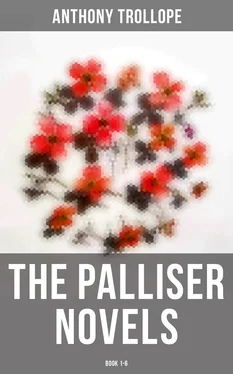"No, I am not angry. But it is understood, of course, that nothing of this shall ever be repeated,—even among ourselves. Is that a bargain?"
"Oh, yes. I shall never speak of it again."
"And now you will wish me joy?"
"I have wished you joy, Lady Laura. And I will do so again. May you have every blessing which the world can give you. You cannot expect me to be very jovial for awhile myself; but there will be nobody to see my melancholy moods. I shall be hiding myself away in Ireland. When is the marriage to be?"
"Nothing has been said of that. I shall be guided by him,—but there must, of course, be delay. There will be settlements and I know not what. It may probably be in the spring,—or perhaps the summer. I shall do just what my betters tell me to do."
Phineas had now seated himself on the exact stone on which he had wished her to sit when he proposed to tell his own story, and was looking forth upon the lake. It seemed to him that everything had been changed for him while he had been up there upon the mountain, and that the change had been marvellous in its nature. When he had been coming up, there had been apparently two alternatives before him: the glory of successful love,—which, indeed, had seemed to him to be a most improbable result of the coming interview,—and the despair and utter banishment attendant on disdainful rejection. But his position was far removed from either of these alternatives. She had almost told him that she would have loved him had she not been poor,—that she was beginning to love him and had quenched her love, because it had become impossible to her to marry a poor man. In such circumstances he could not be angry with her,—he could not quarrel with her; he could not do other than swear to himself that he would be her friend. And yet he loved her better than ever;—and she was the promised wife of his rival! Why had not Donald Bean's pony broken his neck?
"Shall we go down now?" she said.
"Oh, yes."
"You will not go on by the lake?"
"What is the use? It is all the same now. You will want to be back to receive him in from shooting."
"Not that, I think. He is above those little cares. But it will be as well we should go the nearest way, as we have spent so much of our time here. I shall tell Mr. Kennedy that I have told you,—if you do not mind."
"Tell him what you please," said Phineas.
"But I won't have it taken in that way, Mr. Finn. Your brusque want of courtesy to me I have forgiven, but I shall expect you to make up for it by the alacrity of your congratulations to him. I will not have you uncourteous to Mr. Kennedy."
"If I have been uncourteous I beg your pardon."
"You need not do that. We are old friends, and may take the liberty of speaking plainly to each other;—but you will owe it to Mr. Kennedy to be gracious. Think of the pony."
They walked back to the house together, and as they went down the path very little was said. Just as they were about to come out upon the open lawn, while they were still under cover of the rocks and shrubs, Phineas stopped his companion by standing before her, and then he made his farewell speech to her.
"I must say good-bye to you. I shall be away early in the morning."
"Good-bye, and God bless you," said Lady Laura.
"Give me your hand," said he. And she gave him her hand. "I don't suppose you know what it is to love dearly."
"I hope I do."
"But to be in love! I believe you do not. And to miss your love! I think,—I am bound to think that you have never been so tormented. It is very sore;—but I will do my best, like a man, to get over it."
"Do, my friend, do. So small a trouble will never weigh heavily on shoulders such as yours."
"It will weigh very heavily, but I will struggle hard that it may not crush me. I have loved you so dearly! As we are parting give me one kiss, that I may think of it and treasure it in my memory!" What murmuring words she spoke to express her refusal of such a request, I will not quote; but the kiss had been taken before the denial was completed, and then they walked on in silence together,—and in peace, towards the house.
On the next morning six or seven men were going away, and there was an early breakfast. There were none of the ladies there, but Mr. Kennedy, the host, was among his friends. A large drag with four horses was there to take the travellers and their luggage to the station, and there was naturally a good deal of noise at the front door as the preparations for the departure were made. In the middle of them Mr. Kennedy took our hero aside. "Laura has told me," said Mr. Kennedy, "that she has acquainted you with my good fortune."
"And I congratulate you most heartily," said Phineas, grasping the other's hand. "You are indeed a lucky fellow."
"I feel myself to be so," said Mr. Kennedy. "Such a wife was all that was wanting to me, and such a wife is very hard to find. Will you remember, Finn, that Loughlinter will never be so full but what there will be a room for you, or so empty but what you will be made welcome? I say this on Lady Laura's part and on my own."
Phineas, as he was being carried away to the railway station, could not keep himself from speculating as to how much Kennedy knew of what had taken place during the walk up the Linter. Of one small circumstance that had occurred, he felt quite sure that Mr. Kennedy knew nothing.
CHAPTER XVI
PHINEAS FINN RETURNS TO KILLALOE
Table of Contents
Phineas Finn's first session of Parliament was over,—his first session with all its adventures. When he got back to Mrs. Bunce's house,—for Mrs. Bunce received him for a night in spite of her husband's advice to the contrary,—I am afraid he almost felt that Mrs. Bunce and her rooms were beneath him. Of course he was very unhappy,—as wretched as a man can be; there were moments in which he thought that it would hardly become him to live unless he could do something to prevent the marriage of Lady Laura and Mr. Kennedy. But, nevertheless, he had his consolations. These were reflections which had in them much of melancholy satisfaction. He had not been despised by the woman to whom he had told his love. She had not shown him that she thought him to be unworthy of her. She had not regarded his love as an offence. Indeed, she had almost told him that prudence alone had forbidden her to return his passion. And he had kissed her, and had afterwards parted from her as a dear friend. I do not know why there should have been a flavour of exquisite joy in the midst of his agony as he thought of this;—but it was so. He would never kiss her again. All future delights of that kind would belong to Mr. Kennedy, and he had no real idea of interfering with that gentleman in the fruition of his privileges. But still there was the kiss,—an eternal fact. And then, in all respects except that of his love, his visit to Loughlinter had been pre-eminently successful. Mr. Monk had become his friend, and had encouraged him to speak during the next session,—setting before him various models, and prescribing for him a course of reading. Lord Brentford had become intimate with him. He was on pleasant terms with Mr. Palliser and Mr. Gresham. And as for Mr. Kennedy,—he and Mr. Kennedy were almost bosom friends. It seemed to him that he had quite surpassed the Ratlers, Fitzgibbons, and Bonteens in that politico-social success which goes so far towards downright political success, and which in itself is so pleasant. He had surpassed these men in spite of their offices and their acquired positions, and could not but think that even Mr. Low, if he knew it all, would confess that he had been right.
As to his bosom friendship with Mr. Kennedy, that of course troubled him. Ought he not to be driving a poniard into Mr. Kennedy's heart? The conventions of life forbade that; and therefore the bosom friendship was to be excused. If not an enemy to the death, then there could be no reason why he should not be a bosom friend.
Читать дальше












